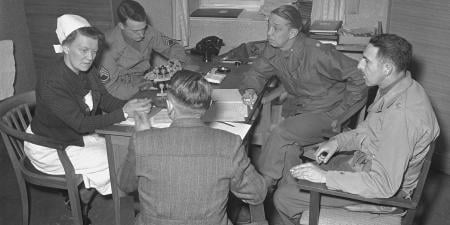Abstract
Two concerns about information from unethical experimentation are its legitimacy and trustworthiness. This article explores guidance about information use from the AMA Code of Medical Ethics.
Justifiability of Using Information From Nazi Experiments
One of the Holocaust’s grim legacies is Nazi physicians’ “brutal medical experiments upon helpless concentration camp inmates.”1 These experiments were often fatal, exceptionally cruel, and performed without subjects’ consent.1 The motivations for these atrocities were to gather information about the human body to enhance Nazi military survival tactics1 and to apply it in service of eugenic goals.2 The range of experiments was wide, including immersion in tanks of ice water to induce hypothermia or death, high-altitude survival, sea water poisoning, wound creation, artificial insemination, and forced sterilization.1 Should information gathered from these experiments ever be used or cited?
This question asks us to consider whether and to what extent using unethically acquired information perpetuates wrong done to Holocaust victims and is separate from considering whether and how such information is or should be regarded as scientifically valid. In Stephen Post’s words, “Because the Nazi experiments on human beings were so appallingly unethical, it follows, prima facie, that the use of their results is unethical,”3 or, as Frank Swain argues, using unethically acquired information encourages unethical practice.4 Some, however, suggest that unethically acquired information can still have value.
The scientific validity of information gathered from Nazi experimentation is debated, with some arguing that it is “not to be trusted at all,”5 while others suggest some of it can be “useful.”6 A recent example of the usefulness of unethically acquired information was a noteworthy operation on a patient suffering from unbearable nerve pain.6 In preparing for the operation, the surgeon “needed to consult the best anatomical maps of peripheral nerves ever created,”7 which were drawn with accuracy—but from “people executed by the Nazis.”7 Referencing the book helped this surgeon help her patient become “pain-free for the first time in years.”7 Some would argue that this use of information demonstrates the information’s value and the justifiability of its use. Others would disagree.
American Medical Association Code of Medical Ethics on Unethical Research
The American Medical Association (AMA) Code of Medical Ethics addresses the use of unethically acquired information. Opinion 7.2.2, “Release of Data From Unethical Experiments,” states: “Research that violates the fundamental principle of respect for persons and basic standards of human dignity, such as Nazi experiments during World War II or from the US Public Health Service Tuskegee Syphilis Study, is unethical and of questionable scientific value” and that such data “should virtually never be published.”8 Although the Code emphasizes the desirability of not promoting use of such information and concern about its scientific value, Opinion 7.2.2 does permit use of unethically derived information in “rare instances when ethically tainted data have been validated by rigorous scientific analysis, are the only data of such nature available, and human lives would certainly be lost without the knowledge obtained from the data,” clarifying that “it may be permissible to use or publish findings from unethical experiments.”8
Opinion 7.2.2 provides further guidance about permissibility of information use in such circumstances, stating that physicians should:
(a) Disclose that the data derive from studies that do not meet contemporary standards for the ethical conduct of research.
(b) Clearly describe and acknowledge the unethical nature of the experiment(s) from which the data are derived.
(c) Provide ethically compelling reasons for which the data are being released or cited, such as the need to save human lives when no other relevant data are available.
(d) Pay respect to those who were the victims of the unethical experimentation.8
References
-
Cohen BC. Nazi medical experimentation: the ethics of using medical data from Nazi experiments. Jewish Virtual Library. Accessed April 24, 2019. https://www.jewishvirtuallibrary.org/the-ethics-of-using-medical-data-from-nazi-experiments
-
Proctor RJ. Racial Hygiene: Medicine Under the Nazis. Harvard University Press; 1992.
- Post SG. The echo of Nuremberg: Nazi data and ethics. J Med Ethics. 1991;17(1):42-44.
-
Swain F. Is it right to use Nazi research if it can save lives? BBC Future. July 23, 2019. Accessed April 24, 2020. https://www.bbc.com/future/article/20190723-the-ethics-of-using-nazi-science
-
Relman A. Quoted in: Moe K. Should the Nazi research data be cited? Hast Cent Rep. 1984;14(6):5-7.
-
Moe K. Should the Nazi research data be cited? Hast Cent Rep. 1984;14(6):5-7.
-
Begley S. The surgeon had a dilemma only a Nazi medical text could resolve. Was it ethical to use it? STAT. May 30, 2019. Accessed April 24, 2019. https://www.statnews.com/2019/05/30/surgical-dilemma-only-nazi-medical-text-could-resolve/
-
American Medical Association. Opinion 7.2.2 Release of data from unethical experiments. Code of Medical Ethics. Accessed April 24, 2020. https://www.ama-assn.org/delivering-care/ethics/release-data-unethical-experiments



